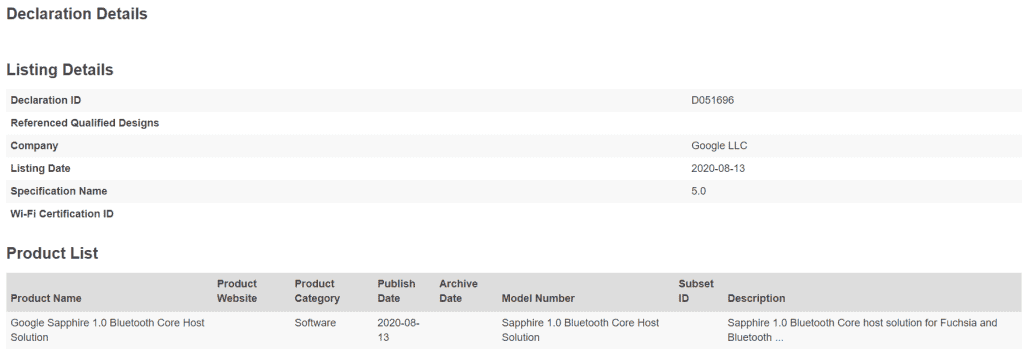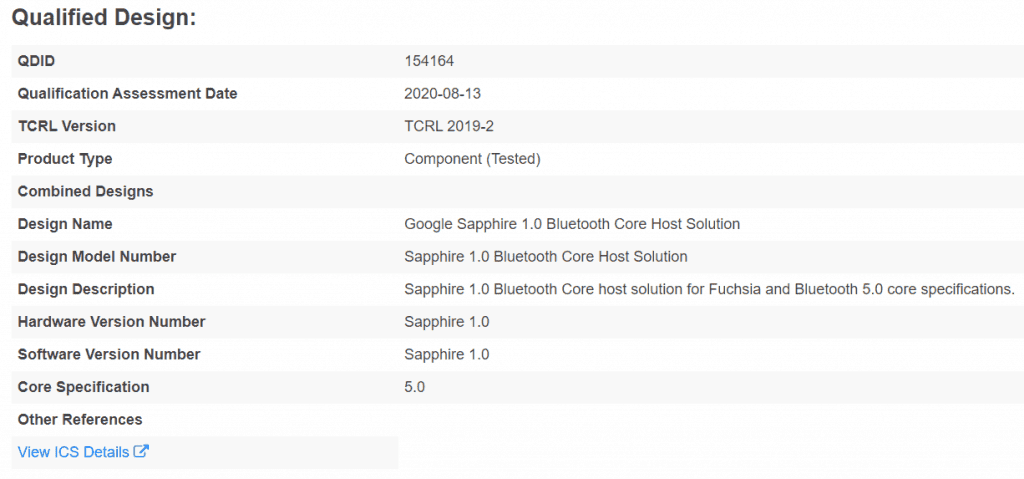As early as 2016, the Fuchsia OS project quietly appeared on GitHub. This means that in addition to Android and Chrome OS, Google is still developing a third operating system. However, after a few years, the mystery of Google’s upcoming operating system has not been fully revealed. As of now, we do not know the real purpose of this system. We also do not know the devices that will support this new operating system. There are speculations that this system will be a replacement for Android, however, this is most unlikely. Nevertheless, this system is on its way and it is not getting relevant certifications.

According to Google, the Fuchsia OS will focus on the Internet of Things (IoT). For a very long time now, there have been no report on this new system. However, the latest information shows that Google Fuchsia OS has passed the Bluetooth 5.0 certification.

Reports show that the codename for the Google Fuschia OS is “Sapphire”. The latest Bluetooth certification shows “Sapphire 1.0″. This certification seems to refer to the first version of the Fuschia system. Furthermore, there are speculations that Fuchsia is already in the internal testing stage. In fact, as early as 2018, Google demonstrated the basic form of the system with GUI through a secret non-public event. Google already has a mobile phone operating system, Android, and a browser system ChromeOS. Perhaps, Fuschia will be for IoT as the company has earlier suggested.
FUCHSIA OS WILL SUPPORT DIFFERENT HARDWARE DEVICES
Fuchsia OS is an open-source project similar to AOSP that can run on multiple devices including smart home devices, laptops, mobile phones, and more. Google’s smart home device, Nest Hub, is considered one of the testing devices for the new operating system.
However, this new operating system is different from Google’s previous systems, Android and Chrome OS, because the latter two are based on the Linux kernel, while Fuchsia OS is based on a new kernel called “Zircon”. Since Fuchsia OS is written using the Flutter SDK running on Android, most of the modules of the new OS can also be run on Android devices. Other than this, we know very little, and the last time we saw the user interface prototype of Fuchsia OS was two years ago.
Here is what Hiroshi Lockheimer, head of Android and Chrome OS, has to say about Fuchsia OS
“We are developing more new features for this operating system. Some people may think this is “new Android” or “new Chrome OS”, but I would like to say that Fuchsia OS is Fuchsia OS – it is a new kind of art operating system world…The significance of the new operating system is that it can support different hardware devices, such as smart home devices, wearable devices, and even augmented reality or virtual reality devices. For mobile phones, we launched Android; for web applications, we launched Chrome OS; so the new system may also be optimized for certain devices, and our team is working in this direction.”





